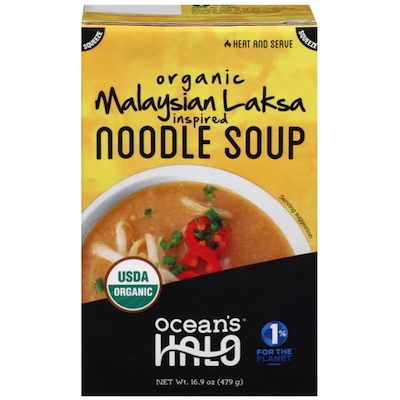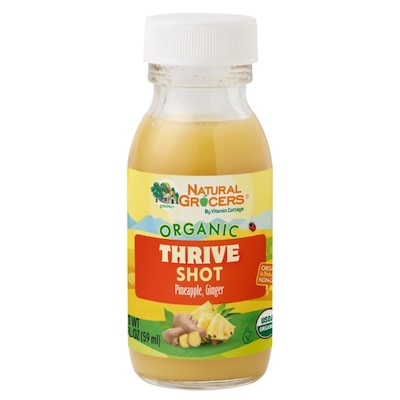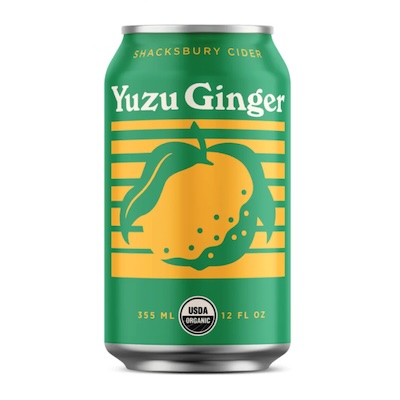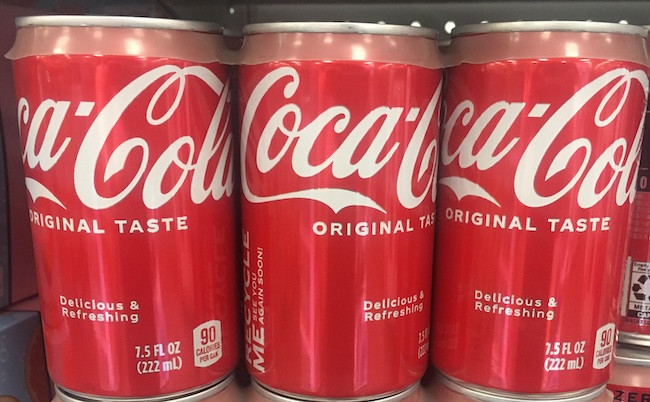
Sweet but Shallow: Many Nutritionists Miss the Bigger Picture on Cane Sugar Coca-Cola
How Organic Insider operates: We accept no advertising, we have no paywalls and we make our newsletters free to everyone because vital information about our industry needs to get out to as many people as possible. Please consider supporting our work, whether you are an individual or a company. Thank you so much.
Coca-Cola’s announcement that it would soon offer a version of its iconic soda made with U.S. (Non-GMO) cane sugar instead of high-fructose (GMO) corn syrup was met with derision and dismissal by many nutritionists, who claimed the switch offered no caloric or metabolic improvement.
They argued it was the same — but it’s not.
This reductionist approach — focusing solely on the body’s response to each form of sugar — ignores systems-level impacts of how ingredients are grown and processed, and how sustainability, biodiversity and long-term resilience are integral to public health.
What received zero attention or insufficient consideration in many analyses were two critical factors:
1) Pesticide Impact
According to the analysis below by ChatGPT*, the pesticide load of U.S. cane sugar (to be used in cane sugar Coca-Cola) vs. U.S. GMO corn (used in regular Coca-Cola) is lower.
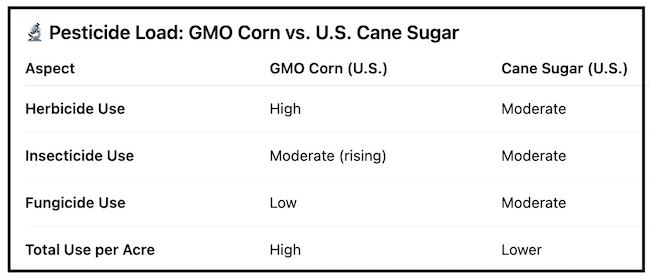
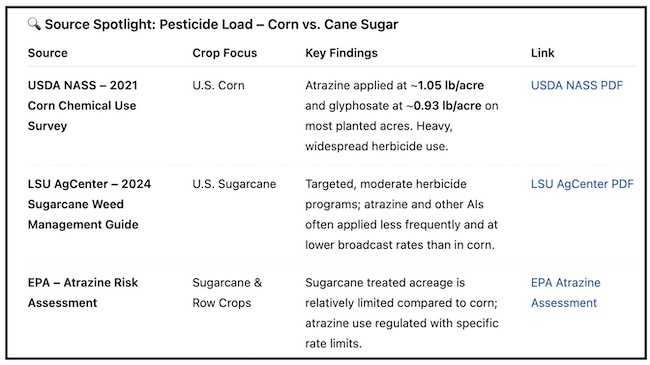
2) The Use of Genetically-Engineered Ingredients
For decades, the GMO industry has used its extensive resources to heavily influence U.S. government agencies and research studies, in addition to aggressively combatting online opposition. Unfortunately, all of these efforts have brought tangible — and troubling — results.
“The public, including most nutritionists and journalists, has been manipulated into believing that GMOs and Non-GMOs are essentially the same, and the muted reaction from the prospect of Coca-Cola removing GMO corn syrup was sheer evidence of this,” said Vani Hari, the food activist widely known as Food Babe.
Yet, in countries that do not pander to GMO lobbyists, opinions about the health and safety of genetically-engineered ingredients differ.
Mexico, in its trade dispute with the U.S., was so concerned about the negative impact of transgenic contamination of its native heirloom corn by GMO corn that President Claudia Sheinbaum signed a constitutional amendment banning the cultivation of GMO corn across the country.
When referring to the CONAHCYT research that the Mexican government presented to the United States-Mexico-Canada Agreement panel, Dr. Michael Hansen, senior scientist at Consumers Reports, stated, “Taken as a whole, it’s clear that you cannot say this GM corn is safe. From a scientific perspective, what Mexico submitted was so much more convincing and so far superior to anything the U.S. put out, it was not even in the same ballpark.”
Even though animal studies conducted by independent scientists have linked GMO corn to a range of health issues, including effects on male fertility, immunological alterations, kidney and liver toxicity, and damage to the digestive system, liver and pancreas, this information is barely acknowledged.
WHAT WE ARE UP AGAINST
No one is claiming that cane sugar Coca-Cola, on its own, is a healthy drink.
Yet, at a time when humanity faces immense personal and environmental health challenges from every direction, a corporation’s voluntary step in a positive direction should be received as such. And if we are to evolve our food system for future generations, ingredient sourcing must be viewed through both ecological and metabolic lenses.
More than anything, however, this is a stark reminder of just how normalized risky GMOs and toxic pesticides have become in our society — and what a cultural uphill battle organic faces.
Sadly, many nutritionists still fail to recognize that health isn’t just about what’s on the label — it’s also what’s behind the label.
—
*Reference to the use of ChatGPT. I used ChatGPT in this research process as a tool to rapidly locate and cross-reference these authoritative datasets and extension guides, allowing me to confirm that U.S. cane sugar production generally involves a lower pesticide load at the field level than U.S. GMO corn. While ChatGPT streamlined the discovery process, all quantitative figures come directly from USDA, LSU and EPA sources.
 |
With gratitude, 
Max Goldberg, Founder |
Quick Hits
* On September 27 in Hudson, NY, the Real Organic Project 2025 Symposium: Antitrust + Food will be held in-person and online. I will be attending.
* Patagonia CEO Ryan Gellert: The EPA is ‘endangering’ America’s businesses on climate.
* Dr. Bronner’s has released its 2025 All-One! Report and recently introduced an employee vanpool program.
* Tradin Organic just came out with its Impact Report 2024.
* Patagonia Provisions launched a line of 100% grass-fed and finished bison sticks, available in three flavors — classic, ranch and jalapeño.
* Led by pioneers of the sustainable textile movement, Marci Zaroff and Matt Reynolds, BeyondFashion is the newly relaunched fashion & home vertical under BeyondBrands.
* Mad Agriculture and Whole Foods Market have announced Wilding, a 1,000-acre biodiverse ecological corridor initiative to be constructed across U.S. farmland.
* How “Grow a Garden” took over Roblox.
* The propaganda to include gene editing (genetic engineering) in organic continues.
* New research finds that when plants talk, insects listen.
New Organic Products
Malaysian-inspired Laksa Noodle Soup from Ocean's Halo
New from Ocean's Halo is the Malaysian-inspired Laksa Noodle Soup. It combines a creamy coconut broth, aromatic spices and hearty noodles to create an optimal balance of umami, tanginess and a hint of heat. USDA certified organic and exclusively available at Whole Foods Market.Wellness Shots from Natural Grocers
Natural Grocers has introduced a line of Organic Wellness Shots. They come in six flavors -- Balance (tart cherry, cucumber, lemon and probiotics), Boost (matcha, ginger, lemon and lime), Digest (coconut water, pineapple, ginger and probiotics), Revive (pomegranate, ginger and elderberry), Thrive (pineapple-ginger tonic) and Vitality (apple cider vinegar, apple, ginger and lemon). Bottled in recyclable glass and exclusively available at Natural Grocers stores nationwide.Carob Cookie and Brownie Baking Mixes from Missy J
Missy J is offering two varieties of Carob Baking Mixes -- brownie and cookie. Made with single farm-sourced Australian carobs, artisanal whole wheat and sustainably produced palm oil, the two mixes are USDA certified organic, gluten-free, vegan, corn-free and caffeine-free.Core Ciders from Shacksbury
Shacksbury has unveiled a line of Organic Core Ciders that come in three flavors -- Rosé (bright, with notes of wild berries), Classic (dry but balanced, fruit-forward) and Yuzu Ginger (a blend of cider, citrus and spice). All have between ABV 5.2 and 5.5% alc/vol. Available at retailers nationwide.
Weekly News Summaries
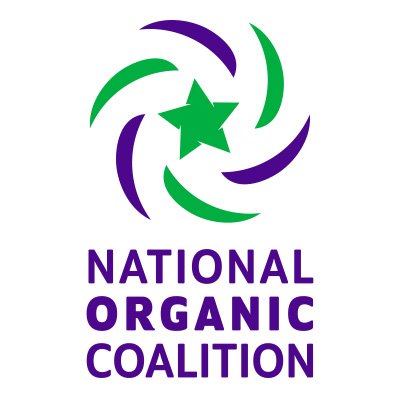
NOC: USDA Reorganization Could Threaten Organic Integrity and Critical Farmer Services
A post from the National Organic Coalition has expressed deep concern that the reorganization could further undermine the government's capacity to fulfill its mission at a time when organic’s credibility and growth depend on robust oversight and enforcement.
EPA announces Plan to Re-approve Dangerous Pesticide Dicamba
Despite the fact that dicamba drift has damaged millions of acres of soybeans and caused devastating damage to farms, home gardens, native plants and wildlife refuges throughout the Midwest and South, this chemical is set to be re-approved.

170,000+ Demand USDA Reject Proposal for Release of GE-American Chestnut Trees into Wild Forests
According to the Global Justice Ecology Project, the GE-trees represent a high-risk ecological intervention never tried before and are based on flawed, incomplete science.

Nara Organics launches Organic Infant Formula with $32M in Funding
By Kathrin Folkendt
Nara Organics has launched what it describes as the first FDA-registered and USDA certified organic whole milk infant formula developed to meet both European and U.S. safety standards.

$24B ‘Organic Cotton Scam’ is Alleged in India, Probe Demanded
A former state minister alleged that certain traders are falsely labeling non-organic cotton as “organic” and earning six-fold profits, while genuine farmers struggle to get even the minimum support price.

U.S. Rep. Marlin Stutzman introduces Apeel Reveal Act
Rep. Marlin Stutzman, (R-IN), has announced the Apeel Reveal Act, which is focused on produce treated with a shelf-life-extending coating developed by Apeel Sciences.

Trump’s Tax Bill Expands Farm Subsidies. Not All Farmers Will Benefit.
By Linda Qiu
Though large family farms and corporate farms amounted to less than 8% of all farms in the United States, they received about 47% of subsidy payments and 67% of crop insurance payments in 2024. Under the new law, payments to the largest and wealthiest will only increase.

Report: Organic Agriculture in Maine Faces Serious Headwinds, Despite Long-Term Growth
By Ari Snider
Despite long-term growth, Maine's organic farming sector is facing serious economic and demographic headwinds, according to a new report from the Maine Organic Farmers and Gardeners Association.

Aldi’s Passionate, Cultlike Following Fuels Its Rapid Expansion Plans
By Julie Creswell
Aldi plans to open 200 stores across the U.S., more than any other grocer, and expects to have around 2,600 locations by the end of the year.
Want to share this newsletter on social media? You can use this link: Newsletter Link
The material in this newsletter is copyrighted and may be reprinted by permission only. All requests must be in writing. Please use our contact form to request republication rights.
Newsletter Archive
Quick Hits
* On September 27 in Hudson, NY, the Real Organic Project 2025 Symposium: Antitrust + Food will be held in-person and online. I will be attending.
* Patagonia CEO Ryan Gellert: The EPA is ‘endangering’ America’s businesses on climate.
* Dr. Bronner’s has released its 2025 All-One! Report and recently introduced an employee vanpool program.
* Tradin Organic just came out with its Impact Report 2024.
* Patagonia Provisions launched a line of 100% grass-fed and finished bison sticks, available in three flavors — classic, ranch and jalapeño.
* Led by pioneers of the sustainable textile movement, Marci Zaroff and Matt Reynolds, BeyondFashion is the newly relaunched fashion & home vertical under BeyondBrands.
* Mad Agriculture and Whole Foods Market have announced Wilding, a 1,000-acre biodiverse ecological corridor initiative to be constructed across U.S. farmland.
* How “Grow a Garden” took over Roblox.
* The propaganda to include gene editing (genetic engineering) in organic continues.
* New research finds that when plants talk, insects listen.
